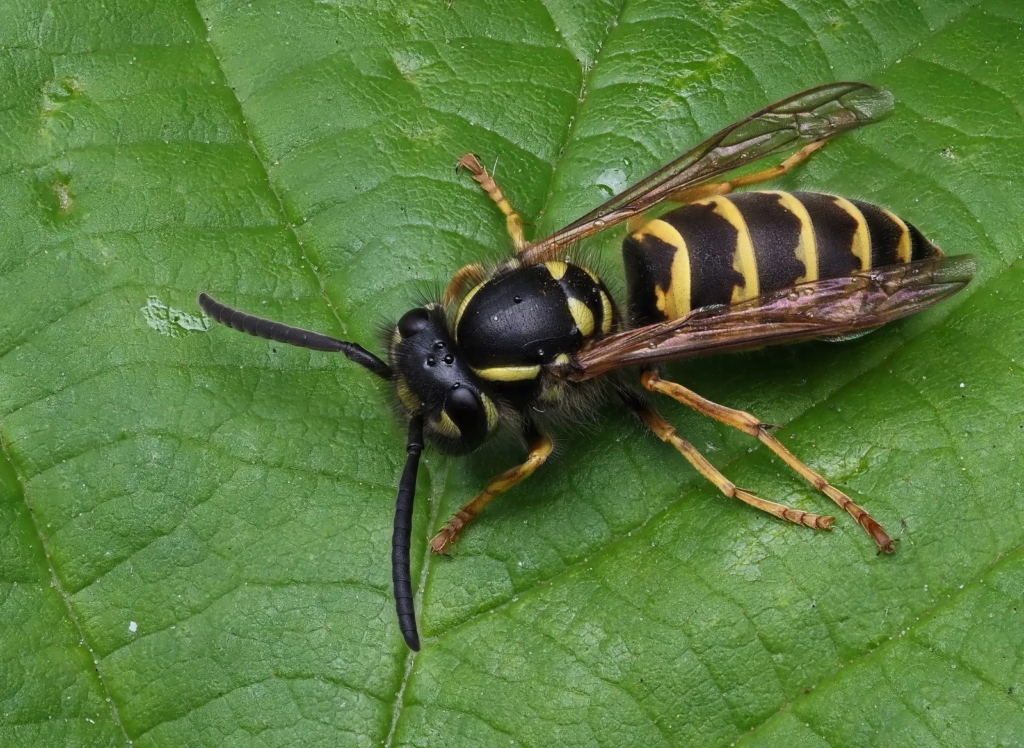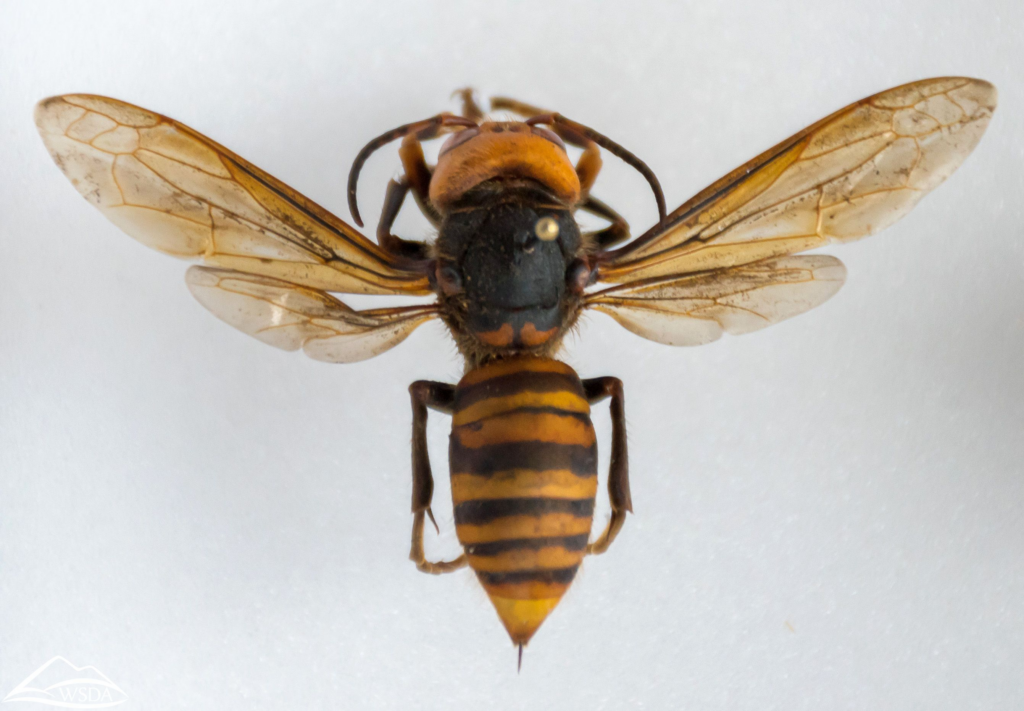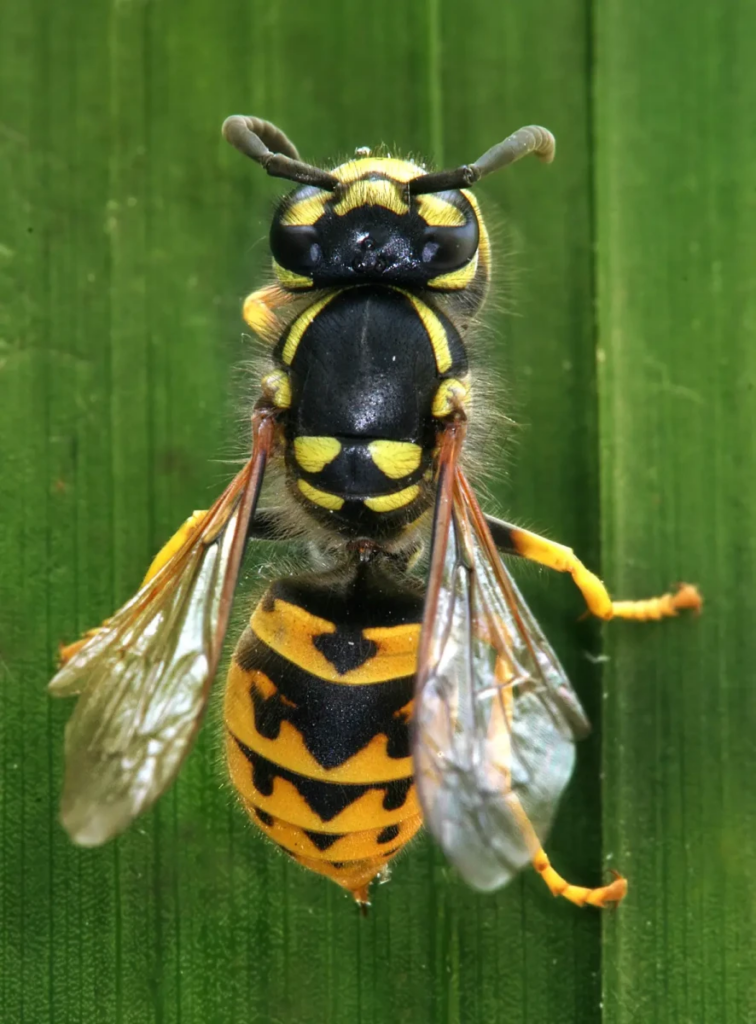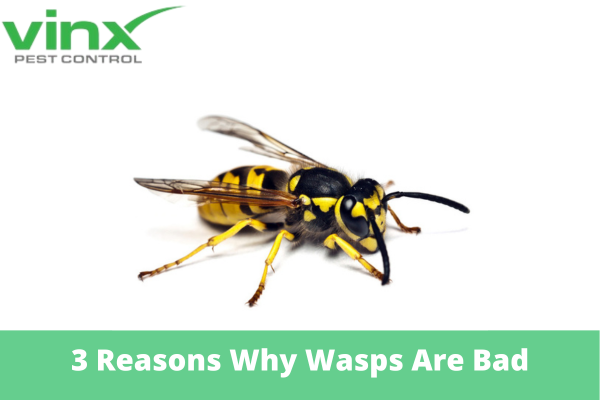When we see wasps in our backyard, we think of our safety first. We know that wasp stings can be 3 Reasons Why Wasps Are Bad
Wasps are feared by many. Their sting hurts a lot and they can be very aggressive. This makes them a big danger to us.
We might not think wasps are that big of a deal. But they can really hurt us. They can make us sick and even damage our homes.
Vinx Pest Control knows how to deal with wasps. We make sure they go away safely. This keeps you and your place safe from harm.
Key Takeaways
- Wasps pose significant health risks due to their aggressive behavior and painful stings.
- Their presence can lead to property damage, affecting homes and businesses.
- Professional wasp removal is key for safety and to stop more problems.
- Vinx Pest Control offers expert services to tackle wasp issues.
- Quick action is needed to avoid the dangers wasps bring.
Understanding Wasps and Their Behavior
It’s important to know how wasps act to deal with them better. Wasps can sting and hurt us. But knowing which wasps are around helps us manage them.

Common Wasp Species in the United States
In the United States, many wasp types exist. Paper wasps, yellowjackets, and hornets are the most seen.
- Paper wasps make nests that look like umbrellas. They are often found under eaves or on trees.
- Yellowjackets build their homes in safe spots like attics or wall spaces. They get angry if they feel threatened.
- Hornets are big and have a painful sting. They are not as common but can be scary.
For tips on handling wasp problems, check out our guide on how to get rid of a wasp.
The Lifecycle and Habits of Wasps
Wasps live in groups with a queen. Their life cycle starts in spring when the queen wakes up and builds a nest.
- The queen lays eggs in the nest. These eggs hatch into worker wasps.
- These workers grow the nest and find food.
- As summer goes on, the colony gets bigger. This means we might see more wasps.
Knowing their habits helps us spot wasp problems early.
Wasps Are Bad: The Top 3 Reasons
Wasps can hurt us in many ways, from painful stings to damaging our homes. It’s important to know why wasps are bad. We will look at the top 3 reasons.
Reason 1: Aggressive Behavior and Painful Stings
Wasps get angry easily, like when their homes are messed with. They can sting over and over, unlike bees. Their stings can hurt a lot and make you swell up.
If you’re allergic, a sting can be very dangerous. You might need to see a doctor right away. To avoid getting stung, move slowly and don’t swat at them. If you do get stung, pull out the stinger and use a cold pack to help.
For more info on wasps, check out this article.

Reason 2: Serious Health Risks and Allergic Reactions
Wasp stings can cause big health problems. For some, it can lead to anaphylaxis, a very bad reaction. Signs include trouble breathing and a fast heartbeat.
If you’re allergic, carry an EpiPen with you. Know the signs of an allergic reaction and get help fast. Wasps can be very dangerous, so it’s good to know about them.
Reason 3: Property Damage and Invasive Nest Building
Wasps can also damage our homes. They build nests in places like under eaves or inside walls. This can weaken buildings and cost a lot to fix.
To avoid damage, find and remove nests quickly. For big problems, get a pro. Knowing how to safely get rid of wasps is key to keeping your home safe.
In short, wasps are bad for many reasons. They can be aggressive, pose health risks, and damage our homes. By understanding these dangers, we can stay safe.
The Dangers of Wasp Stings Explained
Wasp stings can hurt a lot and even be dangerous. They can make people feel sick or even very sick. How bad it is depends on how sensitive you are and how many times you get stung.
Understanding Wasp Venom and Its Effects
Wasp venom is made of many things that can make people react differently. When a wasp stings, it puts venom into your skin. This can make the area hurt, swell up, turn red, and feel warm.
Some people might get very sick from a sting. This can happen if they are allergic to the venom. The venom can cause a big reaction, like anaphylaxis, which is very serious and can be deadly.
- Pain and swelling at the sting site
- Redness and warmth around the affected area
- Potential for allergic reactions, including anaphylaxis

Multiple Stings: Why Wasps Can Sting Repeatedly
Wasps can sting more than once, unlike honeybees. This is because their stinger is smooth. So, they can sting again without getting hurt.
Getting stung more than once can make things worse. This is true for people who are allergic to wasp venom. They might get a bigger reaction from more stings.
- Wasps can sting multiple times due to their smooth stinger.
- Multiple stings increase the risk of severe reactions.
- Individuals allergic to wasp venom are at higher risk.
When to Seek Medical Attention After a Sting
Knowing when to get help after a sting is important. If you have trouble breathing, a fast heartbeat, feel dizzy, or your face, throat, or mouth swells up, get help right away.
Also, if you get stung a lot or if the sting gets infected, you should see a doctor. Knowing about the dangers of wasp stings and when to get help is important for staying safe.
Recognizing Signs of a Wasp Infestation
Knowing the signs of a wasp nest is key to acting fast. Homeowners often call us worried about wasps. Spotting early signs helps stop wasp infestations and avoid stings.
Early Warning Signs of Wasp Activity
More wasps around your home or yard is a big sign. You might see them near a roof corner, tree branch, or hole. Other signs include:
- Wasp activity around a small hole or cavity
- Wasp nests or pieces in attics, garages, or sheds
- Wasp foraging for food or water near your home

Identifying Different Types of Wasp Nests
Wasps build nests in different ways. Paper wasps make umbrella nests under eaves or on trees. Yellowjackets nest underground or in places like wall voids. Knowing the nest type helps you figure out the wasp species and what to do.
Effective DIY Wasp Control Methods
Dealing with wasps can be tough. But, there are ways to control them yourself. Wasps can be dangerous, so it’s important to know how to handle them.
Safe Approaches for Removing Small Wasp Nests
Getting rid of small wasp nests can help control wasps near your home. But, you must be careful. Wear protective clothes like gloves and a veil to avoid stings.
Do this at night when wasps are less active. Make sure you have a way to get out and can reach the nest. Use a dust or foam insecticide made for wasps. This can help avoid getting stung.
Store-Bought Wasp Repellents and Traps
If you don’t want to remove nests yourself, you can use store-bought repellents and traps. There are many kinds, like sprays and baits. They can help keep wasps away.
Look at what’s in the product and if it works on the wasps you have. Always use it as the maker says to keep safe.
Natural and Homemade Wasp Deterrents
You can also use natural and homemade ways to keep wasps away. Oils like peppermint and lemongrass can keep wasps off. Mix these oils with water and spray them where wasps are.
Another trick is to make a fake wasp nest. Wasps don’t like to be near others. Hang a fake nest to scare them away. These methods might not work for everyone, though.
Why Professional Wasp Removal Is Important
DIY wasp control might seem easy, but it’s not always safe. Wasp stings can hurt a lot and cause allergic reactions. They can also damage your home. It’s key to know why getting pros to remove wasps is safer and more effective.

The Limitations of DIY Wasp Control
DIY wasp control often doesn’t work well. It’s risky because wasps can sting and hurt you. Also, DIY methods might not fix the problem for good.
Some big problems with DIY wasp control are:
- Lack of proper protective equipment
- Inadequate understanding of wasp behavior and biology
- Insufficient equipment for safely removing nests
- Risk of incomplete removal, leading to re-infestation
How Vinx Pest Control Safely Eliminates Wasp Infestations
Vinx Pest Control is known for its safe and effective wasp removal. Our team uses the latest tools and gear. This ensures wasp problems are solved without risk.
Our steps are:
- Thorough inspection to identify the extent of the infestation
- Customized removal plans based on the type of wasp and nest location
- Safe and efficient removal of wasp nests using specialized equipment
- Follow-up visits to ensure the infestation is fully resolved
Choosing Vinx Pest Control means your wasp issues are in good hands. We protect your health and home. Our skills show why professional wasp removal is the best way to get rid of wasps for good.
Preventing Future Wasp Problems
By making a few simple changes, you can stop wasps from coming back. This includes changing your yard and keeping your home in good shape.
Landscaping Strategies to Discourage Wasps
Some landscaping tricks can keep wasps away. Here are a few:
- Plant mint, chamomile, and lemongrass to scare them off
- Remove standing water to stop wasps from coming
- Keep your yard clean to avoid giving them a place to hide
Using these tips can help keep your yard wasp-free.
Home Maintenance Tips to Reduce Wasp Attraction
Keeping your home’s outside in good shape is also key. Here’s how:
- Fix any holes or gaps in your home’s walls
- Make sure windows and doors are closed tight
- Check your home’s outside for wasps often
By doing these things, you can keep wasps away from your home.
Wasp Sting Prevention and Safety Measures
To avoid wasp stings, we need to know our surroundings. Wasp stings hurt and can cause serious allergies. Knowing how to prevent stings helps us stay safe.
Protective Clothing and Equipment
Wearing protective clothes is a smart move. When outside, wear:
- Long sleeves
- Gloves
- A hat with a veil
This helps a lot. Also, using bug sprays keeps wasps away.

Behavioral Tips to Avoid Provoking Wasps
It’s key to not upset wasps. Here’s how:
- Stay calm near wasps; don’t move fast.
- Don’t hit at wasps; it makes them sting.
- Don’t wear scented stuff that draws wasps.
Teaching Children About Wasp Safety
Teaching kids about wasps is important. We should teach them to:
- Not bother wasp nests.
- Not touch or hit wasps.
- Stay calm and slowly move away if they see a wasp.
Conclusion
Wasps can hurt our homes and families. They can sting us and damage our property. It’s important to know why wasps are bad.
We talked about the dangers of wasps. They can be very aggressive and cause health problems. We also learned that DIY methods don’t always work.
Getting help from experts like Vinx Pest Control is best. They can safely remove wasps from our homes. This keeps us and our families safe.
We can also take steps to prevent wasps. By changing our landscaping and keeping our homes in good shape, we can avoid wasp problems. This makes our homes safer for everyone.
FAQ
Q: What are the signs of a wasp infestation?
A: Signs of wasps include flying wasps and paper nests. You might also hear buzzing. Spotting these signs means it’s time to act fast.
Q: How can I prevent wasp infestations?
A: To stop wasps, remove food and water sources. Keep your home sealed and clean. This helps keep wasps away.
Q: What are the dangers of wasp stings?
A: Wasp stings hurt and can be deadly, even for those not allergic. If you get stung a lot, it’s serious. Always get help if you’re really hurt.
Q: Can I remove a wasp nest on my own?
A: Removing small nests yourself is risky. It’s better to call experts like Vinx Pest Control. They do it safely and well.
Q: What are some effective DIY wasp control methods?
A: DIY methods include repellents and traps. You can also use natural stuff like peppermint oil. But, DIY might not always work.
Q: Why is professional wasp removal important?
A: Experts like Vinx Pest Control remove wasps safely. They know how to avoid stings and damage. It’s the best way to get rid of wasps.
Q: How can I protect myself from wasp stings?
A: Wear protective clothes and don’t bother wasps. Be careful around them. Teach kids about wasp safety too.
Q: What are some natural wasp deterrents?
A: Use peppermint oil, lemongrass, and plants like mint. These help keep wasps away from your area.
Q: How can I identify different types of wasp nests?
A: Look at the nest’s shape and where it is. Paper wasps have umbrella nests. Yellowjackets nest underground. Knowing this helps you spot wasps early.



